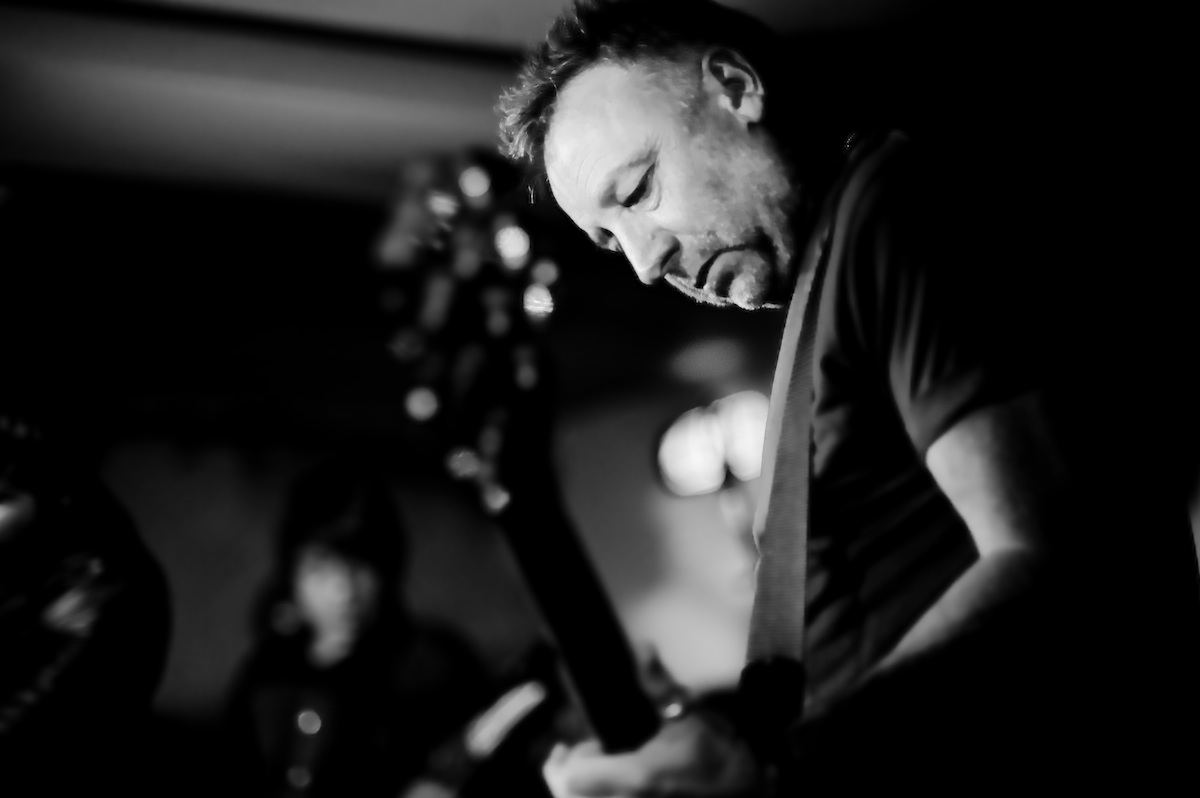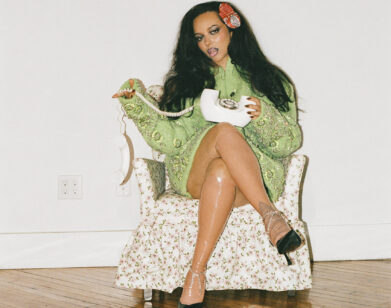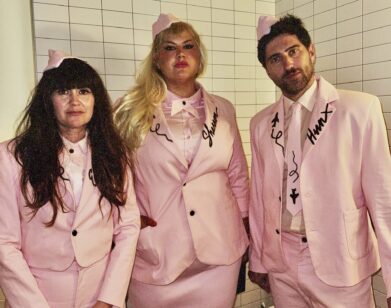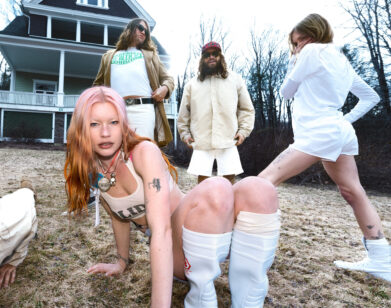After Joy Division and New Order, Peter Hook Steps Into the Light

PETER HOOK. PHOTO COURTESY OF MARK MCNULTY
Peter Hook just wants everyone to get along. But since the legend of his bands—and “legend” is the only word to describe the tale of Joy Division and New Order—involve death, myth and ego, things aren’t that simple. New Order emerged out of the tragic suicide of its lead singer to be more successful than its precursor. But to list the bands that have been influenced by Curtis and co., one would have to name nearly every act who set out to make resonant dance music.
So last year, when Peter announced his intention to start touring with Joy Division albums under the name Peter Hook and the Light, things got even more complicated. The other three members—Bernard Sumner and Stephen Morris (also of Joy Division) and Morris’s wife Gillian (of New Order)—weren’t too pleased. Fans called it sacrilegious. Critics panned it as a last gasp. But Hook’s shows sold out, audiences packed amphitheaters, and he played the entirety of 1979’s groundbreaking Unknown Pleasures.
Now Peter Hook is back again to revisit 1980’s bleak Joy Division swan song Closer. But again, a drama arose: days before he played New York, Hook received word that Sumner, Gilbert and Morris announced that they were re-forming New Order—without Hook.
So when we sat down with Peter Hook, we expected to find a guarded musician hesitant to talk about the past and angered by the media portrayal of the New Order story. Instead, Hook was introspective; looking for answers and hoping to recreate an album he never got to play. He wanted to stay true to the origin—maybe not in ethos, but certainly in sound. Hook waxed honestly (and not unkindly) about Sumner, enthusiastically about his Joy Division project, and in true memory of his former bandmate, Ian Curtis.
LEILA BRILLSON: I see your Hacienda shirt; are you still working with Peter Saville?
PETER HOOK: Yeah, I spoke to him the other day. It’s an odd one really, because we grew up together. He’s been very involved in my record label because he’s an official ambassador for Manchester. I’m an unofficial ambassador.
BRILLSON: What do you think is special about Manchester?
HOOK: I don’t know what it is, there’s something really odd about it and there’s no other place in Britain like it. Manchester’s been consistently fantastic; now you’ve got Elbow, Delphic, Ting Tings, The Courteeners, all great bands. And it shows no sign of abating.
Funnily, the actual structure in Manchester for music is pretty bad. There aren’t many studios. Everybody thinks that it’s the next capital city after London, and yet it isn’t, because places like Birmingham are much bigger than Manchester. Manchester’s actually a tiny city compared to a lot of places in England, but it has stature, because of music and Hacienda, Factory, Joy Division, New Order, The Smiths, The Stone Roses… the list is almost bloody endless. It’s got a hell of pedigree.
I’m just doing Hacienda Records, and we just got two cracking bands in Manchester called Humaniser and Super White Assassins. It’s nice to give something back. There’s no bloody money in it. [laughs] But you do it for love. It’s scary.
BRILLSON: You came out at a time when there was a lot of change going on in the way in which music was produced—literally—the move from analog to digital in terms of recording methods. How did that affect you?
HOOK: Technology, from our point of view, meant synthesizers. It wasn’t really about recording then, it was all analog. When digital recording came in about ’84, everything started to follow into digital. Now, you’ve got the best recording media in the world, but it’s not very pleasing to the ear. Bernard (Sumner) and Steven (Morris) were really into technology; they loved it and tried to explore it and use it whenever they could. As Joy Division, we used little unreliable snares and Bernard’s homemade synthesizer. Then for New Order, we used the prophets, the emulators, the sequencers… it cost a fortune. Even when the tech was considered to be good, New Order used to have three set-ups running on stage so that when one went down—and it wasn’t if one went down, it was when—we could switch to the other. It was a very exciting time: there weren’t many bands that actually ran it live. It was part of our punk ethic.
BRILLSON: I think that’s a lot of why New Order “live” is so celebrated.
HOOK: With all hoo-ha this week about New Order starting again, you have to realize that now there is no money in recording and selling records, so live is very important. It struck me the other day that maybe one of the reasons that the boys have decided, in their infinite wisdom, to play without me is because they need the name to play live to earn money… because as Bad Lieutenant they weren’t earning that much money.
BRILLSON: I’m sure you’ve gotten lots of questions about this in the last week, but if you had been asked, would you have joined the tour?
HOOK: I think I would have. If they’d have asked. We all have proven over the years that it is greater to be together than it is to be apart. The hateful thing is that you sort of need each other and it drives you crazy, but it’s true. I think if they had asked me to do it, I would have. If they had come to me and said we don’t want you included, I still would have let them tour. But they did it without telling me. We’ve done some dealings, shall we say, to allow them to go out as New Order, which are very, very distasteful.
BRILLSON: Do you think that might have been why they didn’t include you?
HOOK: No, I don’t think that Bernard likes me anymore.
BRILLSON: I think that it’s very perceptive of you to realize that there is something about New Order that was all of you.
HOOK: Without a doubt. I hate it as much as he does, but undoubtedly. The fans are not stupid, they know what’s going on. If he concentrates on the keyboards, the bits where my input was less noticeable—people will go “oh, fucking hell.”
In (Sumner’s band) Bad Lieutenant, they played New Order, which always made me wonder why they harped about me doing Joy Division. Yet they always say, “Oh, you shouldn’t be playing with Joy Division,” but they were doing it before me. In Bad Lieutenant, they played New Order and played bass on the keyboard. But if someone else plays the bass, I think that would be detrimental to them.
BRILLSON: Do you use the Joy Division name?
HOOK: No, no. I don’t go out as Joy Division. I go out as Peter Hook and The Light.
BRILLSON: Right. So how did that unfurl? Unknown Pleasures is the “seminal” Joy Division album, but Closer is so much more emotional—there’s a lot of pain there.
HOOK: It’s very introspective. There’s a lot of melancholy. Unknown Pleasures was supposed to be a one-off. I was only going to play it once to celebrate Ian’s 20th anniversary. I was terrified to do it. I’ve played some of the songs over the years, but I’ve never concentrated on them. So when I focused on it, I started to like it more. I love what Martin [Hannett] did to it. And yet, as Joy Division, we ignored Martin. This time, I actually worked to include Martin’s bit—the sounds, the feel, the little tricks he did. It was a collaboration of Joy Division and Martin Hannett. If you listen to Joy Division on YouTube, they’re very different to how they are on the record. And I think we made a mistake. I think we were young, we were arrogant. And that’s what being young and in a punk band is all about. Now, at the ripe old age of 55, you listen to it and think, he really did add a lot. He made it last… he made it lasting. And he made it 30 years ago, but it sounds fantastic, and that is quite unusual for a record.
BRILLSON: Since it was the last album, is it difficult to get into that place to perform it?
HOOK: The thing about it was is that I always knew in the back of my mind how direct the lyrics were on Closer. After Ian died, we literally put Joy Division away to concentrate on New Order. At the time, it was a blessing, and it felt like was the right thing to do. Basically we were hiding our grief in hard work. Which isn’t a bad thing.
BRILLSON: That’s interesting. I’ve read a lot of interviews you’ve done in the past and it seems like there’s a lot of anger there.
HOOK: I think the anger is that you let it happen. The guilt is huge. Ian was his own worst enemy, in that he always told you what you wanted to hear. You wanted the group to be successful, and he was happy to say, “I’m fine, don’t worry. Look at me, I’m fine, let’s get on with it.” And you’d go, “Oh great, that’s what I wanted to hear.” Of course he wasn’t fine. That’s the bit you feel angry about. Because maybe you pushed him into it or he couldn’t say no. He just plowed ahead and the thing he wanted most was for the group to be successful. He didn’t want to let the illness get in the way. What the doctor said to him was, “Stay away from flashy lights, loud noise, try not too get excited, and don’t drink.”
It didn’t take a genius to figure out that at one point he was going to come crashing down to earth. I remember we did a gig and I had to sit on because he was fitting for an hour and a quarter. Common sense really, at my age, says if that was my son, I’d bang all our heads together and take him home. And yet we just carried on. It makes you wonder whose fault—if anybody’s—was the death?
BRILLSON: In the movie Control, Anton Corbijn suggests that there was just a perfect storm of illness and pressure.
HOOK: If you’ve got epilepsy, it’s probably not a good idea to be promiscuous and dump your wife when she’s just had a baby. [laughs] It’s a very human failing, isn’t it?
Anton had a very fixed idea of how we were. I actually recognized myself in Control. He made the actor act like me. He made the Bernard actor act like Bernard. He was very good at mimicking this because he knew us so well. Michael Winterbottom’s 24 Hour Party People [had] no interest in being faithful to the characters. His idea was to tell a funny story. Which he achieved, absolutely. It’s hilarious.
BRILLSON: I’ve gotta ask: the scene when Martin moved Stephen’s drums to the roof and him Steve play and then you guys drove away. Was that true?
HOOK: Yeah, I think we did leave him. We were full of tricks like that. We used to play jokes on each other all the time. The image of Joy Division was very serious and dour and intense—but it’s absolutely wrong.
BRILLSON: You guys also were a punk band.
HOOK: It’s interesting because that early version of “Warsaw,” the one that was on Unknown Pleasures, we made with a producer who was dreadful. I listened to an old version of “Transmission” the other day, and I couldn’t believe how bad it was. If Martin Hannett had not been the producer on Unknown Pleasures, it wouldn’t have been a hit.
At that intensity you were learning five, ten times quicker than normal. Ian was very unfortunate because everything happened to him came at once. Grant Gee, who did the Joy Division documentary, told me he got a modern-day epilepsy expert to look at Ian’s medication. The modern guy said, “If you had given this to any human, it would have killed them.” His doctors were supposed to be the bloody experts, and they didn’t know how to treat him! God knows what his father and mother must have felt like. My son is 22, my daughter is 26. It would be dreadful.
BRILLSON: Your son is in The Light. How is that hearing the sound that you were making at his age coming from him?
HOOK: It’s really creepy. When I look at him it’s even creepier, because he looks like me. But in a way, it makes what you do better. Bass is a vital part of Joy Division. By getting my son to do it is the nearest thing to me in the world. It feels like, “Look what I’ve done!” If could get Bernard’s son to play guitar, who is funnily enough same age as my daughter, if I could get him in…wouldn’t that be wild?
BRILLSON: In what ways have you tried to be authentic, and it what ways have you let yourself explore?
HOOK: I’ve realized that people are very serious about Joy Division. Before I began playing, the hate mail was unbelievable. I’d get mail going “You bastard, you shouldn’t be doing that. Leave Ian Curtis in his grave.” I never expected it to be that vitriolic.
What I tried to do was stay as faithful as I could to the record. People love the record. Since we never toured, it’s quite a pleasure to actually explore the album live.
In a funny way, this is the nearest fans are going to get to Joy Division. According to the rest of the band, that’s a bad thing to do. But the people are going, “We love it. We wish the others were coming.” In a funny way, so do I, but they aren’t.
BRILLSON: Or why don’t you play both albums?
HOOK: I’m working up to doing both. I don’t understand why they don’t just say, “Okay, you play Joy Division, and we’re going to play New Order.”
BRILLSON: As one of those people who has never seen Joy Division, watching you play was haunting. Is it haunting for you, or were you more emotionally removed?
HOOK: No, I’m very emotional. I’m very melancholic. Bernard used to go to great lengths to tell me, “You’re obsessed with the past, you love it too much, you need to get rid of it.” But I’m very proud of it. I remember doing San Francisco and there was a guy waiting outside and he came up to me and said, [Peter switches to an American accent] “I’ve been waiting 35 years for you to do this!” And he showed me his ticket, and it was a Joy Division ticket. When we went to Italy, there were four girls in the front row and they were all crying. I’m very close to Joy Division, but even I don’t understand the power and effect it has on people. I don’t get to enjoy it like that.
BRILLSON: There’s a certain romanticism to the band.
HOOK: To death, sure. It’s the same with Kurt Cobain, Jimi Hendrix, Janis Joplin. There is a mythology to it. What I find fascinating is that me, Bernard and Stephen get old, but Ian is frozen at 23.
BRILLSON: There are a couple other things that set the Joy Division narrative apart from a band like Nirvana.
HOOK: Well, it came at a very glum and gloomy time in England. It fit the mood. Everyone used to always say to me, “Oh, Joy Division is really miserable.” I say “Fuck that, it sounds fucking great!” It used to make me run with adrenaline, run with joy thinking of being able to play for ten people. Just the very playing of it was a wonderful thing. And in 34 years, I haven’t done it.
We did one Joy Division set with New Order at a cancer benefit in Manchester, and then once at Wembley Arena we played nine Joy Division songs. Bernard said it was miserable. So we never played it. And I thought that was actually very sad. For him to stand there and sing something he doesn’t want to sing isn’t going to make him happy. But for me, to play “The Eternal” and “Decades,” when I haven’t heard them played in 30-odd years, is fantastic.
For me, it’s art. When you’re playing an old song start to finish, it’s art. I’m not playing a Joy Division set—you’re playing the album start to finish. I can’t get my head around just being a tribute band. I don’t know what’s going to happen next year. It’s going to be quite weird.
BRILLSON: The bass sound of New Order is completely unique. How have you worked to keep the sound, but also evolve it?
HOOK: It’s a combination of the sound and the melody. It’s unusual for a bass to play melody, or for a bass melody to lead a lot of songs. The bass melodies lead a lot of Joy Division and early New Order. Quite simply, in the end, Bernard got fed up and went out of his way to get rid of it. He didn’t like a counterpoint to his vocal. I realized it was pretty much all over when we were doing “Here to Stay” and he said, “We’re going to have to set your bass to the side.” He told me it was getting in the way of the vocal. Everybody changes, don’t they? Tastes change.
But for me, as a person—and maybe it’s my ego—I want to be out front. I’m not sitting in the back. I’ve always been the one flying into the audience with my bass. I am that way musically as well.
To me, a band is all about the people. I kept saying to Bernard “Listen, rather than do this, do something of your own. Do it as electronic or solo. He’d say, “No, put your bass on.” We came together sometimes, like an old married couple. Occasionally, you make love. At the start, you banged at it. Then it’s once a month, then once a year.
BRILLSON: That’s a shame.
HOOK: It is a shame. But New Order, if you’re going to be painfully honest, has always been fragile since Ian died. It’s always been a bit fucked up because it emerged from a death. But we got through it, and it took a lot of tongue biting and compromising. We did something absolutely wonderful. Gillian [Gilbert, of New Order] deserves a medal; we were insufferable bastards. She’s got balls of steel, that girl. We were horrible. [laughs]
BRILLSON: So this is your first New York show playing Control. Are you nervous?
HOOK: The trouble was, [the business with] New Order made me not want to come. It made me not want to leave home. I didn’t want to come. But playing with the lads, ‘cuz the lads have worked so hard, actually really helped, so I’m thankful for that. I’m fine now, and I’m going to be okay. And I’m going to get through.
PETER HOOK AND THE LIGHT WILL CONTINUE TO TOUR NORTH AMERICA AND EUROPE THROUGHOUT THE REST OF THE YEAR. FOR MORE ON THE ARTIST, VISIT HIS FACEBOOK PAGE.






